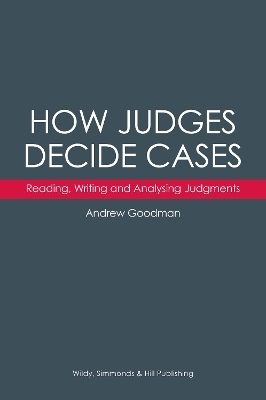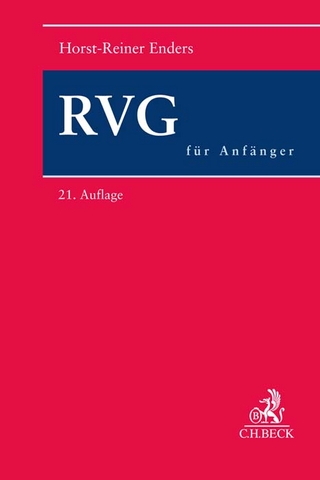
How Judges Decide Cases: Reading, Writing and Analysing Judgments
Wildy, Simmonds and Hill Publishing (Verlag)
978-0-85490-245-3 (ISBN)
This new edition has been revised to take into account modern scientific thinking on bias in decision-making and is generic to all areas of contentious law. Newly appointed recorders, deputy judges, tribunal chairman, lay magistrates and arbitrators as well as experienced practitioners will find it invaluable as a guide to the deconstruction of judgments for the purpose of appeal.
Andrew Goodman is a barrister practising in professional indemnity, disciplinary and regulatory claims and in commercial, property and administrative law. He writes and lectures extensively on a range of subjects and is a Bar Council mediation advocacy trainer.
Introduction
1HOW JUDGES DECIDE CASES
1.1Judicial transparency
1.2The mechanics of fact finding
1.3Questions of weight in fact finding
1.4Evidence on oath
1.5The dilemma of impression
1.6Menschkeit and judicial civility
1.7Conscious and unconscious bias
1.8Decision-making in interim applications
1.9The exercise of judicial discretion
1.10Decision-making by tribunals
2THE APPELLATE JUDGMENT
2.1Appellate courts and tribunals
2.2Decision-making in the Court of Appeal
2.3Dissent
2.4The appeals and appellate committees of the Supreme Court
2.5Delivery of Supreme Court judgments
2.6Decision-making by the appellate committee
2.7The appellate committee and judge-made law
2.8Judicial Committee of the Privy Council
3WRITING JUDGMENTS, DECISIONS AND AWARDS
3.1Delivering and writing judgments
3.2Preparation
3.3Judgment in the lower courts
3.4Judicial training
3.5On finding facts
3.6On addressing the loser
3.7On the task in hand
3.8On the issue of credibility
3.9On the use of language
3.10On using counsel’s written submissions
3.11Personal views on framework
3.12Civil fast track
3.13Family cases
3.14Master’s or district judge’s application
3.15High Court trial
3.16Arbitration
3.17Writing tribunal decisions
3.18A general approach
3.18.1Identify the issues
3.18.2Finding the facts
3.18.3Telling the tale
3.18.4Setting out the law
3.18.5The parties’ submissions
3.18.6Stating the conclusions
3.19Majority decisions
3.20Interlocutory rulings and orders
3.21Model decision-writing for tribunals
3.22Writing appellate judgments
3.23Appellate tribunal awards
3.24Court of Appeal judgments
4READING JUDGMENTS
4.1Basic principles: focus and time
4.2Focus
4.3Time
4.4Inspectional reading
4.5The mechanics of analytical reading
4.6Form and structure
4.7Preparing an analysis
4.8Classification
4.9Interpretation
4.10Deconstruction
4.11Syntopical reading
5THE USE OF LANGUAGE IN JUDGMENTS
5.1The choice of judicial language
5.2Linguistic analysis
5.3The use of words
5.4The structure of sentences
5.5The language of lawyers
5.6Contemporary vocabulary and social change
5.7Dealing with technical and specialist vocabulary
5.8The residual use of legal Latin and French
5.9Literary style in judgments
5.10Judicial literary techniques
5.11Imperative and declarative sentences
5.12The compressive metaphor
5.13The elegant variation
5.14The factual allusion
5.15The literary allusion
5.16Simplification of ideas
5.17Other techniques
5.18The impact of distinctive judicial literary style
6ANALYSING JUDGMENTS: REASONING, ARGUMENT AND LEGAL LOGIC
6.1Reasoning, argument and legal logic
6.2Locating the arguments
6.3Units of reasoning
6.4Finding the solution
6.5The domestic approach
6.6Judicial reasoning and the role of persuasion
6.7Distinguishing grammatical and logical interpretation
6.8Positive judicial argument
6.9Aids to reasoning
6.10The judge and the expert
6.11The use of precedent
6.12Precedent and reasoning
6.13At the coal face: trial judges
6.14Distinguishing your judgment
6.15Ratio and obiter
7ANALYSING JUDGMENTS: TECHNIQUES FOR CRITICISM
7.1Criticising a judgment fairly
7.2Analysing your disagreement objectively
7.3Distinguishing between knowledge and opinion
7.4The focus of your criticism
7.5The mechanics of fair criticism
7.6Uninformed
7.7Misinformed
7.8Illogical
7.9Incompleteness
7.10The structured critique
8USING LAW REPORTS
8.1Fundamentals and difficulties
8.2The functionality of law reports
8.3Accuracy in law reporting
8.4Editorial anomalies
Bibliography
| Erscheinungsdatum | 16.07.2018 |
|---|---|
| Verlagsort | London |
| Sprache | englisch |
| Maße | 152 x 229 mm |
| Gewicht | 448 g |
| Themenwelt | Recht / Steuern ► EU / Internationales Recht |
| Recht / Steuern ► Privatrecht / Bürgerliches Recht ► Berufs-/Gebührenrecht | |
| ISBN-10 | 0-85490-245-7 / 0854902457 |
| ISBN-13 | 978-0-85490-245-3 / 9780854902453 |
| Zustand | Neuware |
| Haben Sie eine Frage zum Produkt? |
aus dem Bereich


